
Finite Verb Definite, Rules, Examples, and List » OnlyMyEnglish
Bedeutung. Sprachwissenschaft die finite Form nach Person und Zahl bestimmte Form. in gegensätzlicher Bedeutung zu infinit. Beispiel: ›arbeitet‹ ist eine finite Form des Verbs ›arbeiten‹. DWDS-Wortprofil.

Wie erkenne ich die finite Verbform? YouTube
Als finites Verb, auch finite Verbform oder Personalform, wird eine Wortform des Verbes bezeichnet (vgl. Wortarten). Das finite Verb ist konjugiert und drückt somit bestimmte grammatische Merkmale aus. Das finite Verb zeigt Person, Numerus, Genus, Modus und Tempus an und ändert sich mit dem Subjekt.
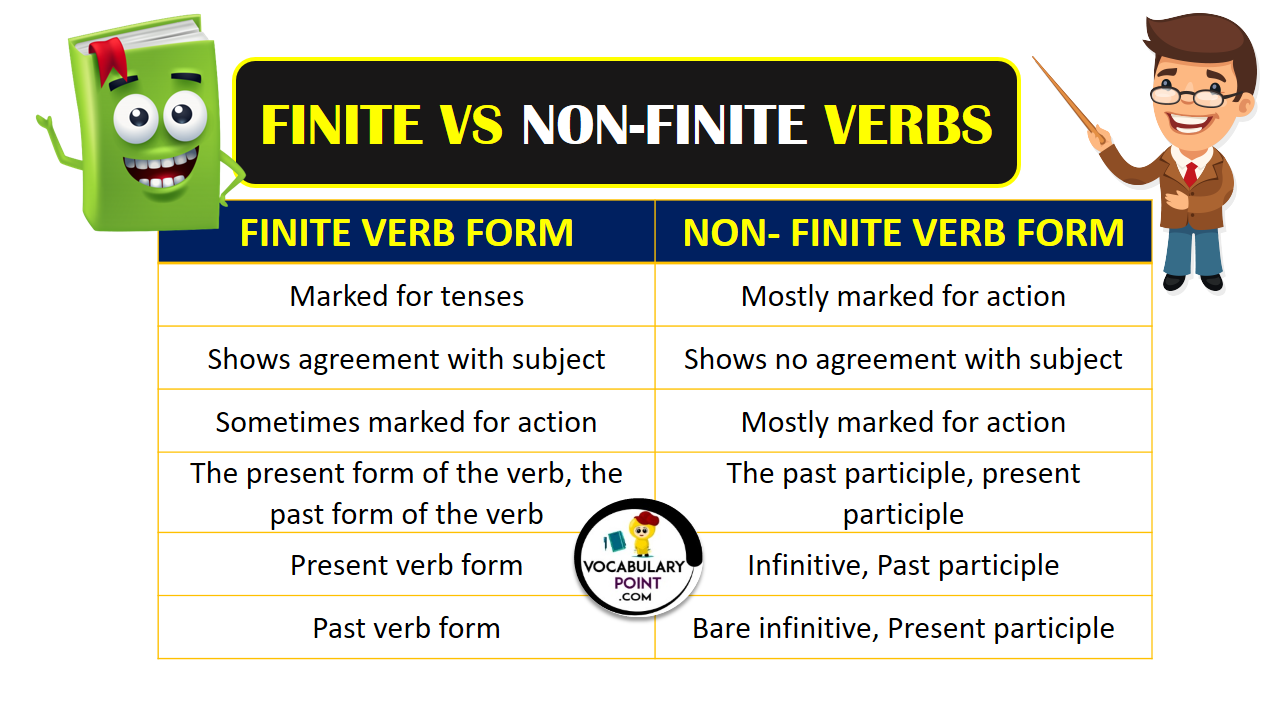
FINITE AND NON FINITE VERBS EXAMPLES Vocabulary Point
Definition, Rechtschreibung, Synonyme und Grammatik von 'finit' auf Duden online nachschlagen. Wörterbuch der deutschen Sprache.
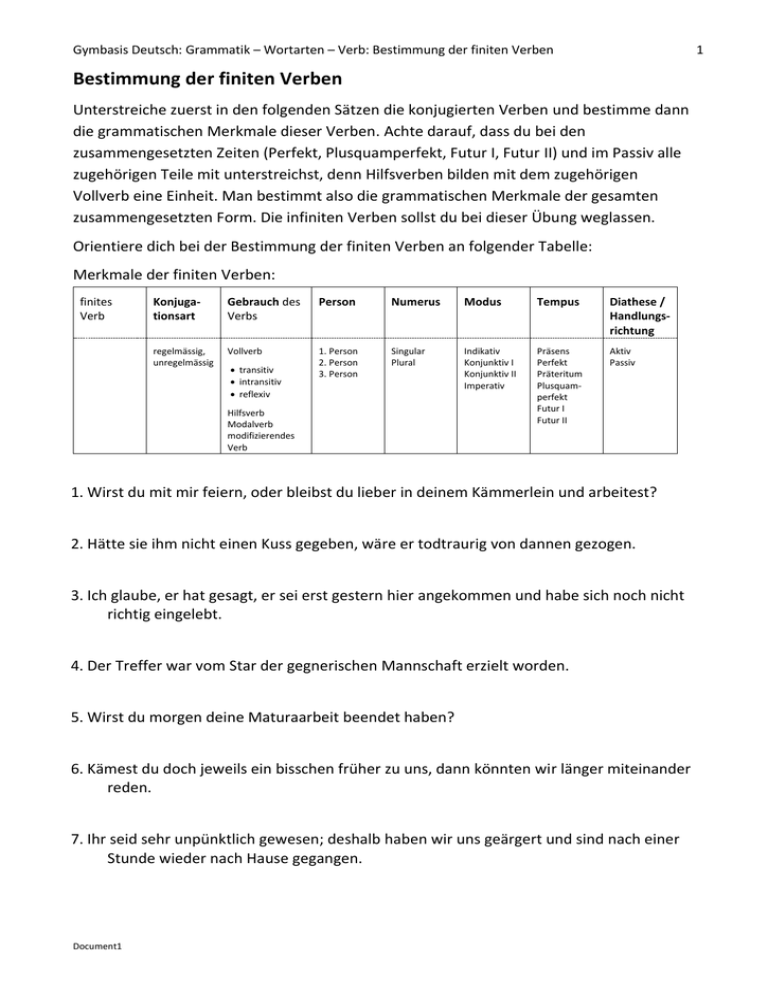
Bestimmung der finiten Verben
Finite Verbs. Finite verbs are those verbs in a sentence that take a subject and have a tense. They are not a category of verb. Instead they refer to the form that the verb is taking. So all verbs can be finite, it just depends what function they have in the sentence. Take for example the verb 'to go'.

Finite Verbs Explanation and Examples
Bei einer finiten Verbform wird die Wortform des Verbes an bestimmte Merkmale wie Person, Numerus, Genus, Modus oder Tempus angepasst (zum Beispiel ich mache, du machst, wir machen, ihr macht). Verben, die in ihrer Form nicht verändert werden, haben eine infinite Verbform.
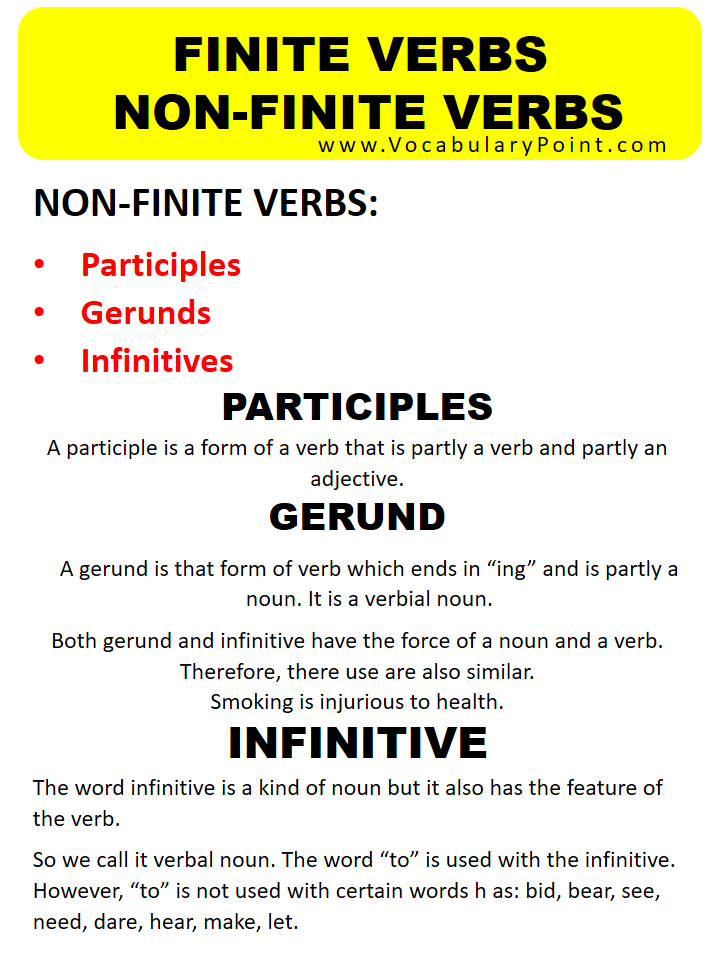
FINITE AND NON FINITE VERBS EXAMPLES Vocabulary Point
Finite Verben sind Verben, die ihre Form durch bestimmte grammatische Merkmale verändern. Dabei spielen Numerus, Person, Modus, Genus Verbi und Tempus eine wichtige Rolle. Das Verb passt sich nämlich genau an diese Merkmale an und verändert dementsprechend die Form.

FINITE VERBS How to Identify and Use them Accurately
Verben ohne Personal- und Tempusendungen bezeichnet man als infinite Verbformen, Verben mit Endungen (geht, werdet, lest) heißen finite Verbformen. Infinite Verbformen - Infinitiv und Partizip infinit nennt man Verbformen, die unabhängig vom Subjekt sind, also in ihrer Form nicht verändert werden.

Finite Verb Definite, Rules, Examples, and List »
Finite and non-finite verbs - English Grammar Today - a reference to written and spoken English grammar and usage - Cambridge Dictionary
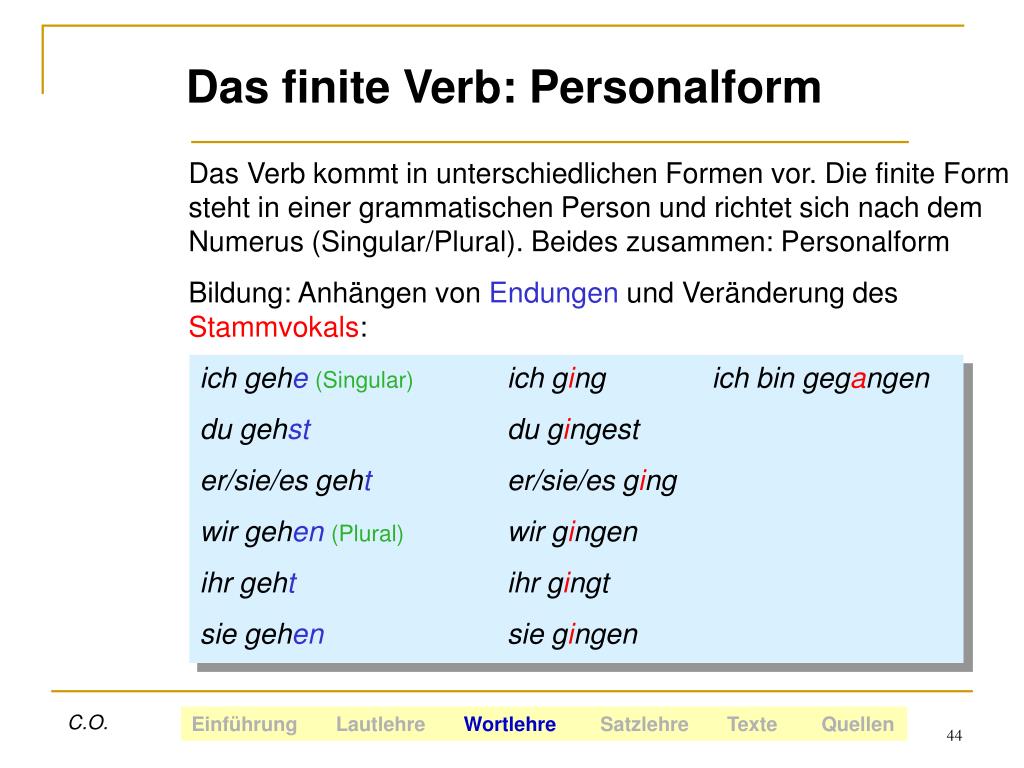
Was Ist Ein Finites Verb Naturalus
In English grammar, a finite verb is a form of a verb that (a) shows agreement with a subject and (b) is marked for tense. Nonfinite verbs are not marked for tense and do not show agreement with a subject. If there is just one verb in a sentence, that verb is finite. (Put another way, a finite verb can stand by itself in a sentence.)

Finite Verbs What Are Finite Verbs? in 2021 Verb, Grammar reference, Easily confused words
A finite verb is a verb that has a subject and shows tense. Here's an example: John cooks carrots. (The finite verb is "cooks." The subject is "John." The tense of the verb is the present tense .) A finite verb is always one word, from which you can determine the tense. John was cooking carrots. (The finite verb is "was."
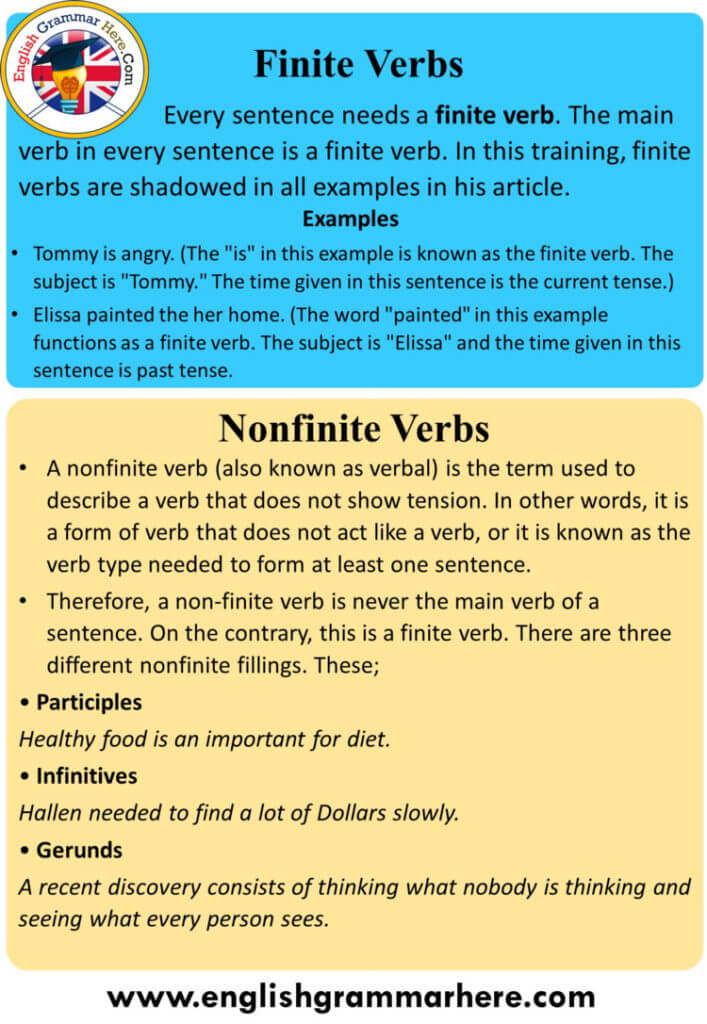
20 examples of finite verb, Definition and Example Sentences English Grammar Here
Some forms of a verb are referred to as non-finite. The present and past participles and the to infinitive are the most common of these. The base form is often used in a non-finite way. Every verb can be used in a clause in either a finite or non-finite way. A verb is finite if it is found in a clause in combination with a subject and a tense.

Identifying a Finite Verb following 3 Simple tricks YouTube
Als finite Verbform (Gegenbegriff: Infinite Verbform) bezeichnet man Wortformen eines Verbs, die bestimmte grammatische Merkmale ausdrücken und dies mit besonderen syntaktischen Eigenschaften verbinden; im Deutschen besteht die wichtigste Besonderheit finiter Verbformen darin, dass nur sie ein Nominativsubjekt bei sich haben können.. Die finiten Merkmale in der Grammatik des Deutschen sind:

Finite verbs Engquizzitive
finite verb [ fahy-nahyt vurb ] show ipa nounGrammar. a verb form that distinguishes person, number, and tense, as well as mood or aspect: in She works from home, the verb works indicates a third-person singular subject ( she ), present tense, and indicative mood, the mood used for ordinary statements and questions about facts.:
/Finiteverb-5b2bfce3ba61770036b9d39f.png)
Finites Verb Beispiel
Traditionally, a finite verb (from Latin: finitus, past participle of finire - "to put an end to, bound, limit") [1] is the form "to which number and person appertain", [2] : 125 in other words, those inflected for number and person. [3] Verbs were originally said to be finite if their form limited the possible person and number of the subject.
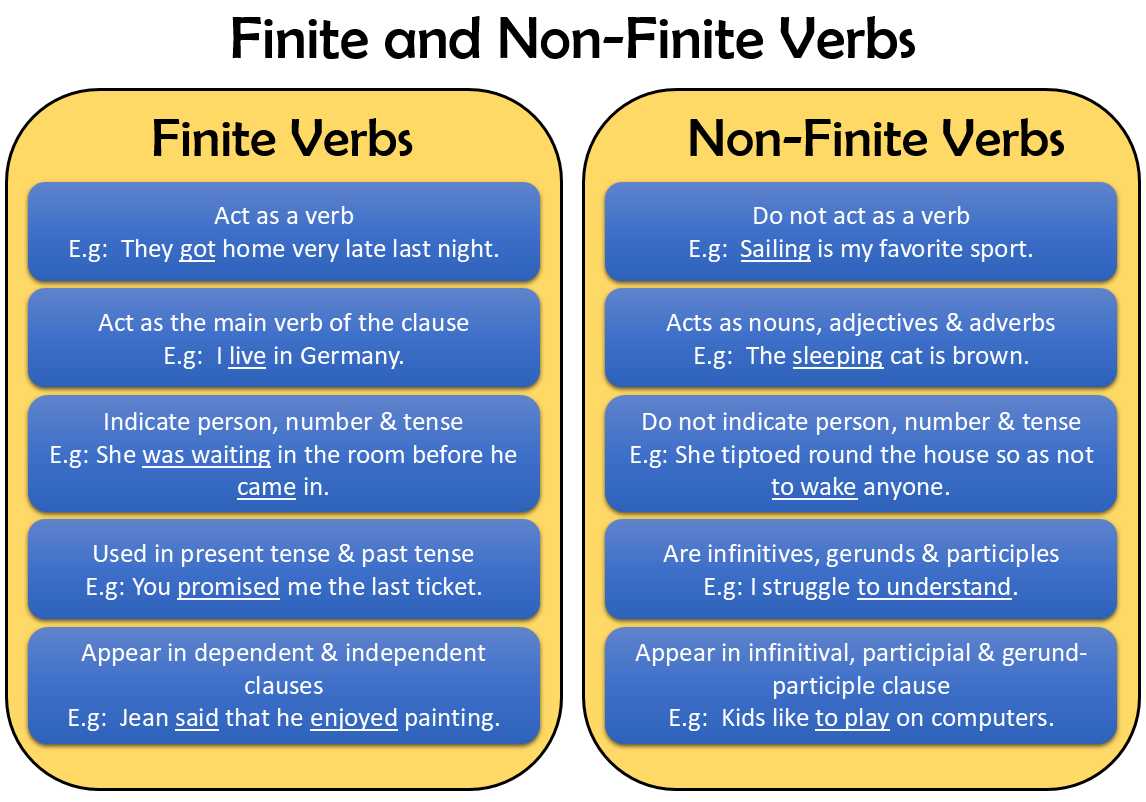
Gul Mohar Class 8 English Grammar Finite and NonFinite Verbs
a tense (present or past) Every sentence must have a finite verb - even sentences that are not in the present or past tenses. Finite verbs can stand alone in a sentence or as part of a verb phrase. If there is more than one verb in the sentence, the finite verb is usually the one closest to the subject. Advertisement Examples of Finite Verbs

PPT Kurs Leseverstehen Kursleiter Dr. Stephan Stein Wintersemester 2006/2007 PowerPoint
Bis hierhin zusammengefasst: Eine finite Verbform ist ein Verb, das morphologisch (= von der Form her) dem Subjekt im Satz angepasst ist. Das finite Verb verrät uns die Person (1., 2., oder 3. Person) und den Numerus (Singular oder Plural). Dies nennt man „ Kongruenz ". Das Prädikat kongruiert im Deutschen mit dem Subjekt.